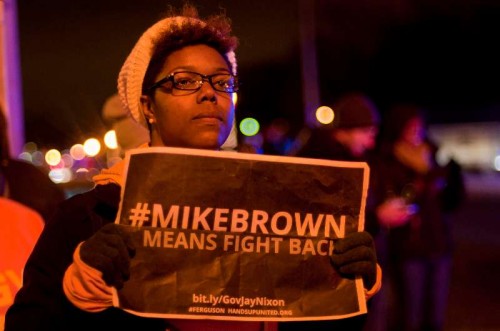
A woman takes part in a protest against the grand jury’s decision not to charge police officer Darren Wilson in the fatal shooting of African American youth Michael Brown, in Ferguson, Missouri, the United States, Nov. 24, 2014. Violence erupted Monday night in Ferguson after the announcement that police officer Darren Wilson would not be indicted for shooting unarmed 18-year-old Michael Brown
Several US protest leaders said that nationwide demonstrations against a grand jury decision to not indict a white police officer who shot dead an unarmed black teenager would continue to grow, as they did not see “meaningful reform” in many areas.
“We’re going to continue to take to the streets, we’re going to continue to disrupt the daily order…until something really really happens for the people in our communities, until we see some meaningful reform,” said Tuesday Phillip Agnew, co-founder of the activist group Dream Defenders, Xinhua reported.
Agnew was one of the protest leaders who met with President Barack Obama at the White House Monday, when Obama held a series of meetings with cabinet members, civil rights leaders and law enforcement officials to address the distrust between police and minorities.
Protests in Ferguson, a suburb in Missouri, flared up and spilled over to more than 170 US cities, after a county prosecutor announced the grand jury decision Nov 24 that Darren Wilson, a former Ferguson police officer, would face no criminal charges for the Aug 9 shooting of 18-year-old Michael Brown.
The protests have triggered a national debate over race relations and police power in the US. But Obama has adopted a cautious stance on the issue and has not visited Ferguson since protests broke out.
On Monday, Obama pledged a $263-million fund for law enforcement agencies. Out of the money, 75 million dollars would be used to purchase up to 50,000 body-worn cameras for police departments nationwide to record interactions with the public.
Obama said he would set up a task force to improve community policing and build trust between communities and law enforcement officials.
He also said he would consider tighter controls on the proliferation of military-style weapons and equipment provided to the police.
Protest leaders said the meeting with Obama was a sign that their demonstrations were making progress but they still needed to see notable progress in many areas.